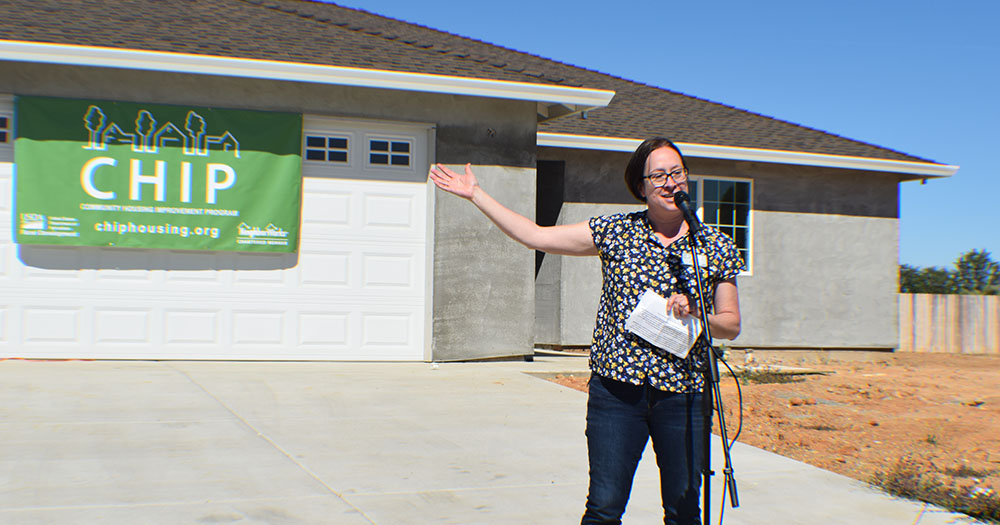
Seana O’Shaughnessy speaking to the community at CHIP’s 2000th home event (Photo: CHIP)
California Forward is committed to advancing policy intersections that create a more inclusive and sustainable California where all people can prosper. To move this forward, we must reimagine a state where we address the racial and geographic inequities that have been exacerbated by a public health and economic crisis, and we must answer the call to dismantle structural racism. The Voices of Shared Prosperity series amplifies the stories of Californians who are committing their time and talent to solutions that embrace equity, environmental sustainability, and economic opportunity.
Community Housing Improvement Program (CHIP) President and CEO Seana O’Shaughnessy took the helm of the 48-year-old housing organization, based in Chico, in the wake of the Paradise Camp Fire. CHIP serves seven counties based in the North State including Butte, Glenn, Tehama, Shasta, Sutter, Yuba, and Colusa.
Recognized as the most destructive wildfire in the state’s history, the region is still working to rebuild. A native of Paradise, O’Shaughnessy is uniquely qualified and deeply invested in the redevelopment of the region.
“My parents lost their home, but we all knew someone who was a part of this shared crisis. I was excited to be offered this job so that I could do something about housing [in the region] because it is so desperately necessary,” she shared.
Initially earning a master’s degree in women’s history, O’Shaughnessy’s original plan was to be a professor. She changed her mind and decided to commit her time and talent to nonprofit work. “I didn’t want my labor to just enrich a corporation, I wanted my labor to have a positive impact in the world,” she said.
CHIP works to provide affordable housing options to low-income, rural underserved residents, seniors, and others who are in need of financial and literacy support to reach their housing goals. Guided by the motto “Helping People Help Themselves,” CHIP has a wide range of support options – from constructing mutual self-help (sweat equity) housing, where communities build homes themselves, to the management of rental properties and providing farmworker housing. The organization also collaborates with communities to offer important information and services to rental residents.
O’Shaughnessy has a long history leading affordable housing work in the Bay Area as well as in the North State. Before joining CHIP, she served as the executive director for Rebuilding Together Peninsula. No stranger to taking leadership during challenging times, O’Shaughnessy took her position as executive director in 2007, just before the start of the Great Recession in 2008. As the market recovered and housing prices soared in the Bay Area, O’Shaughnessy decided to move her family back to Chico.
Although contentious, O’Shaughnessy credited Prop 13 with making it possible for regular people to stay in their homes especially in the Bay Area. “You shouldn’t have to rely on luck to have a house or be in a very high-paying industry to have a home.”
She highlighted the continued impact of the Paradise Camp Fire saying that it “wiped out 14,000 units of housing – much of it was affordable.” O’Shaughnessy underscored the existing housing challenges facing the region but emphasized its relative affordability. Following the Camp Fire, she says that the County’s homelessness population per capita is comparable to San Francisco County and Los Angeles County.
| In 2019, Butte County California, where the City of Paradise is located, has a 12% fewer residents living in prosperous neighborhoods than the state as a whole, as shown in the California Dream Index. Learn more about the Prosperous Neighborhood indicator and the broader California Dream Index here. |
|---|
O’Shaughnessy insists that the funding formulas presented by the state are biased toward urban areas. She points specifically to opportunity maps as a barrier to housing development in rural communities noting that “the intention of opportunity maps is spot on – but they don’t work in rural communities. They don’t reflect the reality on the ground.” She critiques these formulas for pulling funding from rural areas that need housing development but are ineligible because of lack of density or area resources.
O’Shaughnessy supports the development of tools and metrics that recognize the unique landscape and resource allocations in rural communities as well as proposed tax credit allocation to support the redevelopment of communities impacted by natural disasters.
She continues to champion the urgency of housing construction in rural communities and uses her expertise to build partnerships and communities that increase opportunities for those that need it most.
She serves on the Camp Fire Collaborative and will be co-chairing the housing committee starting November 2021. She is currently on the board of the California Coalition for Rural Housing. O’Shaughnessy holds a bachelor’s degree in history from Holy Names University and a master’s degree in women’s history from Sarah Lawrence College.
The Voices of Shared Prosperity stories will be shared in advance of the 2021 California Economic Summit taking place on November 9-10.

